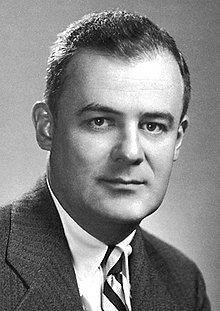Frederick Chapman Robbins
Frederick Chapman Robbins | |
|---|---|
 | |
| Born | August 25, 1916 |
| Died | August 4, 2003 (aged 86) |
| Nationality | American |
| Alma mater | University of Missouri Harvard University |
| Awards | E. Mead Johnson Award (1953) Nobel Prize in Physiology or Medicine (1954) |
| Scientific career | |
| Fields | Pediatrics Virology |
| Institutions | Case Western Reserve University |
Frederick Chapman Robbins (August 25, 1916 – August 4, 2003) was an American pediatrician and virologist. He was born in Auburn, Alabama, and grew up in Columbia, Missouri, attending David H. Hickman High School.
He received the Nobel Prize in Physiology or Medicine in 1954 along with John Franklin Enders and Thomas Huckle Weller, making Robbins the only Nobel laureate born in Alabama. The award was for breakthrough work in isolating and growing the poliovirus in tissue culture, paving the way for vaccines developed by Jonas Salk and Albert Sabin. He attended the University of Missouri and Harvard University.
In 1952, he was appointed professor of pediatrics at Case Western Reserve University.[1] Robbins was elected a fellow of the American Academy of Arts and Sciences in 1962.[2] From 1966 to 1980, Robbins was dean of the School of Medicine at Case Western.[3] He was elected to the American Philosophical Society in 1972.[4] In 1980, he assumed the presidency of the National Academy of Sciences' Institute of Medicine. He had been a member of the National Academy of Sciences since 1972.[5] Five years later, in 1985, Robbins returned to Case Western Reserve as dean emeritus and distinguished university professor emeritus.[6] He continued to be a fixture at the medical school until his death in 2003. The medical school's Frederick C. Robbins Society is named in his honor. His wife, Alice N. Robbins, died in 2016. She was the daughter of Nobel laureate John Howard Northrop.
Robbins received the Benjamin Franklin Medal for Distinguished Achievement in the Sciences of the American Philosophical Society in 1999.[7]
See also
[edit]References
[edit]- ^ Frederick C. Robbins on Nobelprize.org
- ^ "Book of Members, 1780–2010: Chapter R" (PDF). American Academy of Arts and Sciences. Retrieved 6 April 2011.
- ^ "Professor Frederick C. Robbins". The Independent. London. August 8, 2003. Archived from the original on November 4, 2012. Retrieved May 2, 2010.
- ^ "APS Member History". search.amphilsoc.org. Retrieved 2022-08-18.
- ^ "Frederick C. Robbins". www.nasonline.org. Retrieved 2022-08-18.
- ^ Health Sciences Tour. 4. Frederick C. Robbins Building. Case Western Reserve University
- ^ "Benjamin Franklin Medal for Distinguished Achievement in the Sciences Recipients". American Philosophical Society. Retrieved November 27, 2011.
Further reading
[edit]- Zetterström, Rolf; Lagercrantz Hugo (2006). "J.F. Enders (1897–1985), T.H. Weller (1915–) and F.C. Robbins (1916–2003): a simplified method for the multiplication of poliomyelitis virus. Dreams of eradicating a terrifying disease". Acta Paediatr. 95 (9): 1026–8. doi:10.1080/08035250600900073. PMID 16938745. S2CID 30811791.
- "The Abraham Flexner Award for distinguished service to medical education. Frederick C. Robbins, M.D". Journal of Medical Education. 63 (2): 121–2. 1988. doi:10.1097/00001888-198802000-00006. PMID 3276892.
- Bendiner, E (1982). "Enders, Weller, and Robbins: the trio that 'fished in troubled waters'". Hosp. Pract. (Off. Ed.). 17 (1): 163, 169, 174–5 passim. doi:10.1080/21548331.1982.11698030. PMID 6295913.
- Marshall, E (1980). "Institute of Medicine names Robbins president". Science. 207 (4436): 1184–5. Bibcode:1980Sci...207.1184M. doi:10.1126/science.6986655. PMID 6986655.
- Sulek, K (1968). "[Nobel prizes for John F. Enders, Frederick Ch, Robbins and Thomas H. Weller in 1954 for discovery of the possibility of growing poliomyelitis virus on various tissue media]". Wiad. Lek. 21 (24): 2301–3. PMID 4303387.
- Frederick C. Robbins on Nobelprize.org including the Nobel Lecture, December 11, 1954 The Cultivation of the Poliomyelitis Viruses in Tissue Culture
- Frederick Chapman Robbins — Biographical Memoirs of the National Academy of Sciences
- 1916 births
- 2003 deaths
- Case Western Reserve University faculty
- University of Missouri alumni
- Hickman High School alumni
- Harvard Medical School alumni
- Members of the United States National Academy of Sciences
- American Nobel laureates
- Nobel laureates in Physiology or Medicine
- Polio
- American virologists
- Fellows of the American Academy of Arts and Sciences
- American pediatricians
- People from Columbia, Missouri
- Scientists from Missouri
- People from Auburn, Alabama
- Members of the National Academy of Medicine
- Members of the American Philosophical Society

